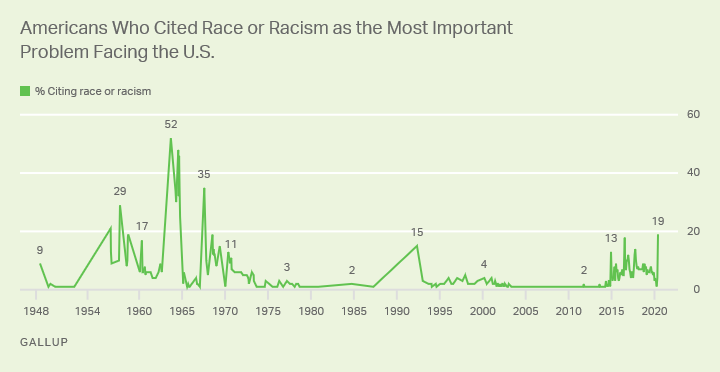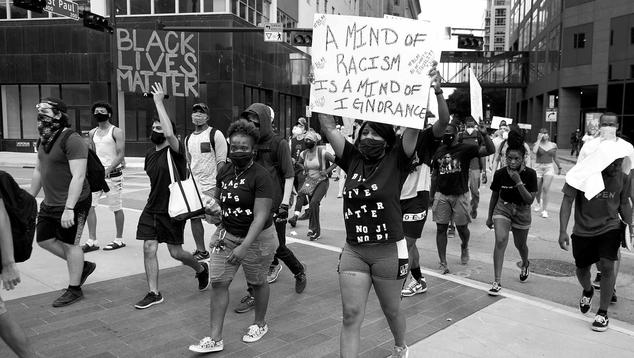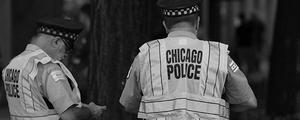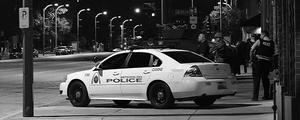Gallup's long-standing "most important problem" question provides important context for measuring the impact of the May 25 death of George Floyd in Minneapolis. The question asks Americans to name, off the top of their head, the most important problem facing the nation. Gallup has been asking this question since 1939 -- every month since 2001 and throughout the decades prior to that on a less regular basis.
The question provides a unique gauge of the salience of the many, many potential concerns that face the country at any given point in time. The consistency with which the question has been asked over the past 80 years gives us a solid indicator of the historical ebb and flow of race and race-related issues in the average American's mind.
Of course, we didn't have systematic survey research in the years prior to the 1930s. Had there been, race would no doubt have been a dominant response to the most important problem question at many points over the tumultuous centuries since the nation's founding, both leading up to and following the Civil War and the Jim Crow years that followed.
Since 1939, I can best characterize the results of our most important problem trend question as a series of spikes -- periods of time when race moved into the forefront of Americans' consciousness, inevitably followed by longer periods of time when race is much less frequently mentioned as the nation's top problem.
As such, I think race can be defined as a latent concern for Americans. It is consistently present in the background of Americans' thinking and has become a little more likely to be mentioned by Americans in recent years on a consistent basis. But race moves to a more manifest or front and center position when external events function as prompts or reminders.
The current situation is one of these times. Some 19% of Americans named race relations as the nation's top problem in our May 28-June 4 survey. This is, by one point, the highest percentage since July 1968 and is the latest example of periodic points in time when mentions of race as the most important problem reach double digits.

Line graph. The percentages of Americans who cited race or racism as the most important problem facing the United States. 9% of Americans cited this issue in Gallups June 1948 reading compared with 19% who said so in Gallup latest reading.
The first recorded mention of race in response to Gallup's most important problem question came in 1948 when 9% of Americans named it as the top problem. That year saw President Harry Truman issue executive orders which prohibited discrimination in civilian agencies and which segregated the nation's armed forces -- the nation's first significant federal civil rights actions since the years after the Civil War.
Soon thereafter, mentions of race as the top problem fell back, only to rise again in periodic spikes as race moved into and out of the news. In 1957, a group of nine black students enrolled in Little Rock's Central High School, culminating in President Eisenhower calling out federal troops to keep order, and the percentage of Americans naming race as the top problem jumped to 27%. That year, Eisenhower also signed into law the Civil Rights Act of 1957.
Then came the 1960s, when mentions of race as the nation's top problem were at their longest sustained highpoints in Gallup's history. From September 1963 to September 1964, a quarter or more of Americans named race as the most important problem facing the nation across a number of Gallup surveys, including 52% (the highpoint) in September 1963, following the March on Washington and Martin Luther King Jr's famous "I Have a Dream" speech. By the next summer, Congress passed, and President Johnson signed into law, the Civil Rights Act of 1964, and at several points in and around that time, over 40% of Americans named race as the nation's top problem.
Mentions of race jumped again in the summer of 1967 as riots and rebellion swept across Newark and Detroit, and Gallup recorded periodic double-digit mentions of race throughout the remainder of the 1960s. Race thereafter didn't appear in meaningful percentages in mentions of the nation's top problem throughout the remainder of the century, with the lone exception of a May 1992 survey when 15% named race as the top problem following rioting in Los Angeles after the Rodney King verdict.
In recent years, Gallup's monthly most important problem updates have picked up spikes in mentions of race following highly publicized racial incidents, mainly involving police actions. These include double-digit readings in 2014 after deaths of black men at the hands of police in Ferguson, Missouri, and Staten Island, New York, in 2016 and 2017 (following incidents such as the confrontations in Charlottesville, VA), and the 19% measured earlier this month. Additionally, we have seen a modest uptick over the past five years in routine, baseline mentions of race as the top problem in the months between spikes, in contrast to the decade and a half prior to that when race mentions were consistently very low.
Whether sustained double-digit mentions of race as the nation's top problem will continue in the months ahead remains to be seen. Other issues are competing with race in Americans' perceptions of the top problem facing the nation, including the coronavirus, problems with government, and economic concerns -- all essentially tied with race in Gallup's May 28-June 4 survey at the top of the most important problem list.
Everything else being equal, however, the historical record predicts that race will eventually fall back into its latent status, scoring relatively few mentions as a top-of-mind issue. This exemplifies the substantial challenge facing leaders who are seeking significant and lasting change in the nation's race situation. The less top of mind race is as a major problem, presumably, the less likely politicians are going to feel pressure to take action.
Leaders throughout history have embraced public protests and civil disobedience as effective ways to bring about social change. Continuing attention given to incidences of racial injustice such as police shootings, and race protests and race rebellions can function to keep race high in Americans' consciousnesses. Beyond this, however, leaders are going to need to turn to other courses of action. One such strategy is to propose specific, tangible remedies such as the legislation now in Congress that would address concerns relating to police actions. Developing proposals to change existing attitudes in the ways that non-black Americans look at the race situation and to address the general concept of "systemic discrimination" in American culture and society will present more of a challenge.




